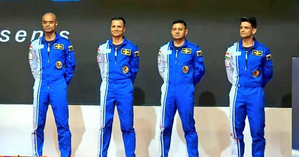America
ISRO Selects Prime Pilot for Upcoming Indian-American Space Mission to ISS

Aug 3 :
The Indian Space Research Organisation (ISRO) has selected the lead pilot for the first joint Indian-American space mission to the International Space Station (ISS). Group Captain Shubhanshu Shukla was chosen for the mission as a consequence of a space flight agreement between the American spaceflight corporation Axiom Space Inc. and the Human Space Flight Centre of ISRO. Axiom-4 is the name of the upcoming private astronaut trip to the International Space Station (ISS), which will be carried out in collaboration with NASA and SpaceX.
The National Defence Academy was attended by Group Captain Shukla, who was born in Lucknow, Uttar Pradesh, on October 10, 1985. He became a member of the Indian Air Force (IAF) fighter stream on June 17, 2006. Shukla is an experienced fighter combat leader and test pilot with almost 2,000 hours of flying time on several aircraft, including the MiG-29 and Su-30 MKI.
The Keralan Group Captain Prasanth Balakrishnan Nair would be flying beside him as an emergency pilot. Nair, a graduate of the National Defence Academy, is a Cat A flight instructor with approximately three thousand hours of experience and was commissioned into the Indian Air Force on December 19, 1998.
In the first week of August 2024, the chosen pilots, called "Gaganyatris," will begin mission training. While on board the ISS, they will do space outreach events, scientific investigations, and technological demonstrations.
There will be stronger collaboration between ISRO and NASA, and the Indian Human Space Program stands to gain a lot from the expedition. In a joint statement published during Prime Minister Narendra Modi's formal state visit to the U.S. in June 2023, the two countries envisioned a coordinated effort in human spaceflight missions, which is in line with this. The crew members will not be able to fly to the ISS unless the Multilateral Crew Operations Panel (MCOP) gives its final permission. The success of this mission will be a huge boost to India's space exploration capacity and its ability to work with other space organizations.



































